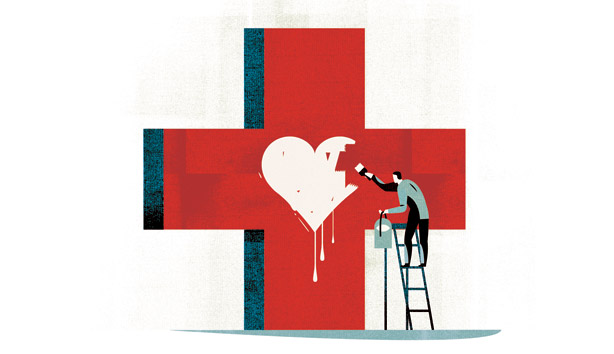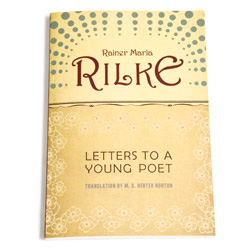Big Ideas Engaging the Culture, Changing the World
A Healing Way
Why Character Matters to Health Care
By Philip W. Eaton, President

The issues of health and health care have sucked our nation into an intense debate. How can we provide adequate health care for all the people of our country? That seems to be the driving question. Then we have had to ask as well: How can we keep so many people from slipping through the cracks? And then this question has become hugely important: How can we provide good care that will not bankrupt our whole society? These are not easy questions, as we have discovered.
Of course, when we extend these questions into the far reaches of our globe, the issue becomes massive and sweeping and threatening. How to provide even basic care to those who are trapped in global poverty — that's perhaps the most pressing question for our time. How is it possible to address the enormous scourge of rampant disease or the malnutrition of children who are caught innocently in the intractable web of numbing poverty and violent conflict?
We recognize quickly that health and health care require of us our best energies. We need research. We need far-reaching application of that research. We need care that is fueled by the latest of technology, and we need the tender touch of basic human care. We need well-trained and dedicated young people to catch a vision that health care is critical to the future of our world. We need young people with smart minds and hearts that are big.
And so, in all of this, we must ask this question: What should we be doing at a Christian university like Seattle Pacific to address these huge concerns of health and health care in our nation and across our globe? What is the distinctive difference we can bring to this table? That's the kind of question I am always asking.
I think I found at least part of an answer this past spring from one of our nursing graduates. This wonderful student was chosen by her classmates to speak at the Nurses' Pinning Ceremony. And in the midst of her comments, she said something like this: "Oh, can you imagine what the world might become if every SPU nurse would actually love his or her patients?"
Could such a posture actually address the world's most complex problems? Perhaps this wonderful student put her finger on the heart of the difference I am looking for: What if, along with the best training in skill and competence, come compassion and gentleness and a deep savvy about the deeper dimensions of healing? Perhaps this begins to get at that something more we have to offer.
"What if, along with the best training in skill and competence, come compassion and gentleness and a deep savvy about the deeper dimensions of healing?"
We talk about graduating people of competence and character. This is not always how the university of our day understands its purpose. I often get comments like, "What do you mean by character formation? How in the world could you ever measure the outcome of character formation? Shouldn't we just focus on the skills and let the contested notion of character go?"
N.T. Wright has just written one of the most important books on character you will find anywhere. And in the end it is all about changing the world. The book is called After You Believe: Why Christian Character Matters. Wright puts the notion of Christian character this way: "Precisely because the greatest Christian virtue is love, modeled on that of the creating and life-giving God, the individual Christian and the church as a whole must develop the settled habits of looking out for what's going on in the surrounding world, rejoicing with its joy, weeping with its grief, and above all eager for opportunities to bring love, comfort, healing, and hope wherever possible."
Isn't this what my graduating student was getting at? And I would like to think her life in our university contributed mightily to her deep conviction of how to carry out her profession, how indeed she might address with her life and her skills the great challenges of health and health care. Perhaps we helped her "develop the settled habits" of the heart that can look out at both the joy and the grief of our world. Here she was, I believe, at her pinning ceremony, eagerly anticipating a life of "bring(ing) love, comfort, healing, and hope wherever possible."
That's the difference we want to bring to the table of health and health care, isn't it?
One last note on all of this. "Imagine living in a community," says Wright, "where, day by day, the normal habit of life for most people includes immorality, bad temper, jealousy, factions, envy, and so on." Imagine creating a community like that for our university. Would we have the chance to influence the lives of our students to develop the habits of the heart to bring about a better world?
But then, says Wright, "Imagine living in a community where, day by day, the normal habit of life is patience, kindness, gentleness, and self-control — not to mention love, joy, and peace." This is the kind of community we want to build for our university, a community of trust and grace and love. We work so hard at this precisely because we have a chance of being a place where our students catch a vision for a profoundly different way, a healing way, of using their skills.
On Campus and Beyond
C.S. Lewis for Today
A Gathering in Oxford
How did the great Christian intellectual C.S. Lewis make the case for the Christian faith in his time? How does C.S. Lewis speak into our lives in our own time? The Reverend Earl Palmer and Shirley Palmer, President Philip Eaton and Sharon Eaton, and SPU staff member Kim Gilnett served as hosts for "A Gathering of Friends," September 9–13, 2010, to explore these questions and reflect on the legacy of Lewis' life and work. Nearly 40 individuals from across the U.S. gathered in Oxford, England, where Lewis spent much of his life and did much of his writing.
SPU Foundation Board member Bill Clancy and his wife, Doris, were a part of this gathering of friends. "This was our first exposure to Lewis' personal life and the importance of his writings to Christianity," he said. "Doris and I enjoyed sharing this learning experience with other Christians and are anxious to read more of Lewis' works."
The President's Bookshelf
 Letters to a Young Poet
Letters to a Young Poet
Rainer Maria Rilke,
translated by M.D. Herter Norton
Norton, first printing 1934
In this book of letters, written over the months of 1903 and 1904, we listen in on an intimate conversation between an experienced practitioner and a young novice who yearns to learn and grow. We overhear unexpected advice, and sometimes startling, penetrating, often wise insight into writing, living, and leading.
 Wolf Hall
Wolf Hall
Hilary Mantel
Henry Holt, 2009
The British novelist Hilary Mantel takes us deep into the life and times of the inimitable King Henry VIII. Our focus is on those pivotal years between 1500 and 1535, that extraordinary moment when Tudor England is unhooked from the Roman pope so that the ruthless Henry can marry Anne Boleyn. This is a fascinating novel, reporting history, while at the same time decidedly interpreting history.
Scheduled for Spring Release
Eaton Book Explores the Role of the Christian University
Forthcoming from InterVarsity Press, President Eaton's new book, Engaging the Culture, Changing the World: The Christian University in a Post-Christian World, lays out many of his deepest convictions about what he describes as "the powerfully important role of the Christian university to make a difference in a world that yearns for something more." Additional information about the book will be available soon.
